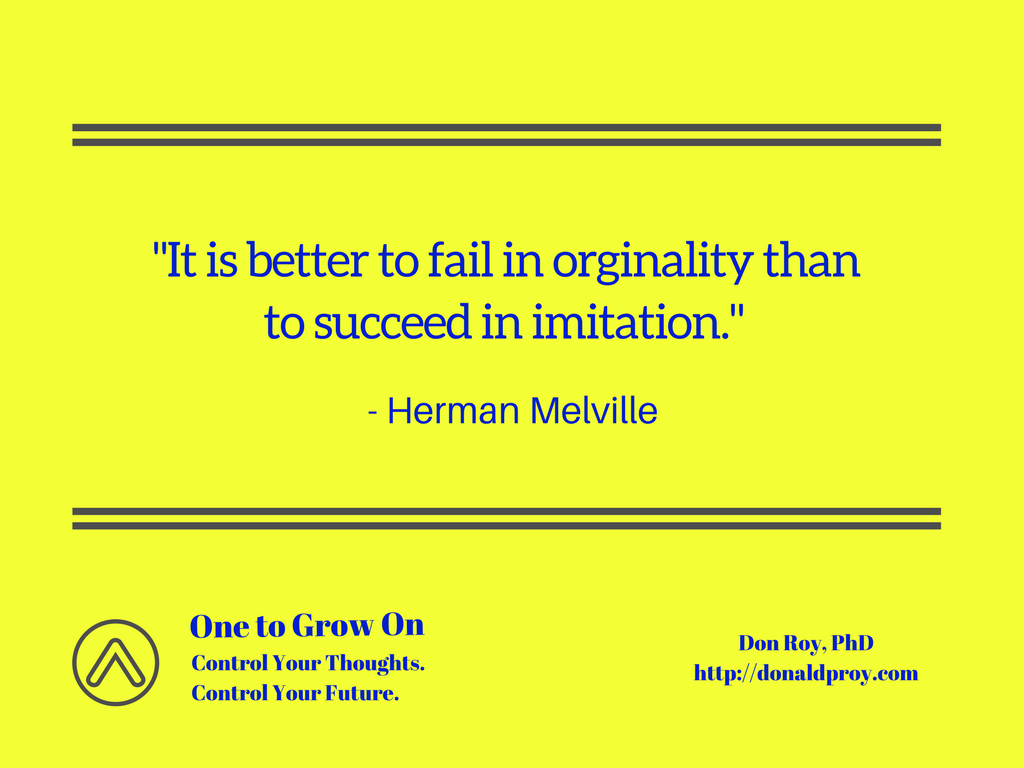We live in exciting yet challenging times when it comes to carving out a distinctive brand. It is easier than ever before to create, deliver, and amplify your brand message. Doing so is no longer reserved for the powerful or those with access to communication channels… we all have access to communication channels.
The challenge to brand building is reconciling your brand message with the likelihood that it will not resonate with everyone. In fact, you may very well find fierce opposition to brand values for which there is no compromise. A safe play could be to follow the lead of other brands. We value best practices and other proven methods or tactics. Imitation is the sincerest form of flattery, or so we have been told.
This week’s One to Grow On quote is encouragement to avoid the inclination to be followers. Author Herman Melville suggests failing in originality holds greater value than succeeding in imitation. The thought of failing at anything may not seem like an aspiration, but should we be open to the possibility of failure in trying something original?
Comfort in Imitation
As I reflected on Melville’s quote, I quickly identified that any decision to pursue imitation for me is driven by a desire to remain in a comfort zone. Why take risks that could lead to failure when the comfort zone offers certainty? The attraction of the comfort zone varies with one’s risk aversion. For some people, the comfort zone is like a force field that keeps out pain and embarrassment that can come with failure.
The lure of imitation is strong when it comes to following best practices. A popular format for presenting best practices is lists. The suggestion is follow the list and you, too, will find success. It is like a paint-by-numbers approach to life.
A quick search for marketing best practices list returned these examples:
- “5 Best Practices for B2B Email Marketing List Management”
- “6 Mind-Blowing Tips to Optimize Your Social Media Marketing”
- “105 Ways to Build Your Email List: Tips, Tactics and Best Practices”
You have probably seen such “listicles.” The premise is amazingly simple—follow the guidance of the list for a proven path to success. If you can withstand having your mind blown and have the patience to sift through 105 ways to do something, positive results can come your way. The question is whether the success is yours, or are you living out someone else’s plan?
The Call to Originality
One of the most refreshing aspects of today’s marketing environment is the space for authentic brands. An alternative to cookie-cutter brand thinking is to establish brands consistent with personal values of the brand owner. I admire brands whose founding story includes a strong commitment to values. Patagonia, TOMS, and Warby Parker are three brands that come to mind as being rooted in their values. These brands come across as original because their strategies are consistent with their values and beliefs. In other words, they have succeeded by being original.
Building a brand on originality has drawbacks, chief among them is the brand will not be embraced by everyone. Personal conviction about your brand’s values will run into opposition and indifference. Your originality sucks (I don’t think so, but others will because you are “different”). Moreover, being original does not guarantee success. You can feel like you have not only stepped beyond a comfort zone; you are on a ledge and depending on the approval of others to maintain balance.
The Originality Obligation
Achievement rarely occurs from imitation. Author Todd Henry ends each episode of his Accidental Creative podcast by saying: “Cover bands don’t change the world. Don’t be a cover band. You need to find your unique voice.” Being original is hard and risky compared to being an imitator. However, the rewards and fulfillment awaiting those willing to pursue originality makes it an intriguing proposition.


